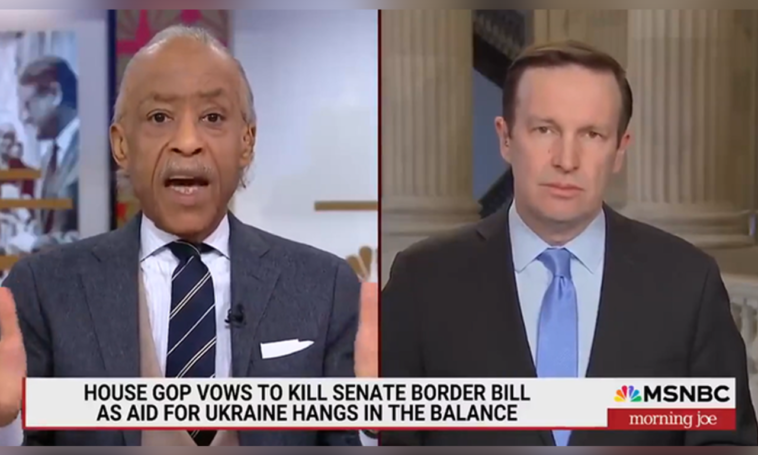The recent remarks made by MSNBC host Al Sharpton, particularly his use of the term “invasion” to characterize the ongoing border crisis, have added fuel to the already contentious debate surrounding the Senate immigration bill.
“But the border, I mean, we’re looking every day at the invasion of migrants, and they’re playing a time game with politics on this?” Sharpton asked. “Couldn’t the pressure be put to bear in their home states?”
Sharpton’s choice of words has ignited controversy, with some liberals expressing concern over the use of such language, while others argue it accurately reflects the severity of the situation at the southern border.
The Senate immigration bill, unveiled over the weekend, has been hailed by President Biden and politicians from both the Democratic and Republican parties as a bipartisan effort to address border security.
However, not all members of the GOP share this sentiment, contending that the bill is inadequate and that President Biden already possesses the necessary authority to take action on border security without additional legislation.
One of the key points of contention within the bill is the inclusion of Title 42-type authority, which would only be mandated if the number of daily migrant encounters at the southern border exceeded 5,000. Critics, including Democratic California Senator Alex Padilla, have voiced their opposition, labeling the proposed legislation as a “new version of a failed Trump-era immigration policy that will cause more chaos at the border, not less.”
To shed light on the bill and build public support, Senator Chris Murphy, a Democrat from Connecticut, appeared on “Morning Joe,” where Al Sharpton questioned him about strategies to encourage voters to pressure their senators into supporting the legislation.
Sharpton’s urgency in addressing the “influx of migrants” resonated with his viewers, as he pointed fingers at senators who were not endorsing the bill, accusing them of “allowing this to continue.”
In his quest to rally public support, Sharpton suggested leveraging the outrage felt by people across the country regarding the situation at the border. He emphasized the need for constituents to pressure their senators to act.
“Couldn’t there be some kind of public pressure put in the next couple of days in some of these senators’ states saying, ‘Why are you allowing this to continue?’ Because at the end of the day, senators have to deal with their voters,” Sharpton urged.
However, it was Sharpton’s use of the term “invasion” to describe the influx of migrants that stirred controversy. The term, historically associated with far-right rhetoric, has become more mainstream within the Republican Party since the rise of former President Donald Trump in 2016.
In a piece for HuffPost, senior reporter Paul Blumenthal raised objections to this choice of language, warning against the characterization of immigration as an “invasion.”
Blumenthal highlighted the historical context of such rhetoric, citing its use to fuel support for anti-immigration measures, including the infamous Chinese Exclusion Act of 1882. He quoted University of Baltimore School of Law professor Matthew Lindsay, who argued that portraying immigrants as a faceless mass, racially incapable of assimilation, has been a tactic to undermine the principles of liberty and exploit them through low wages.



One Comment
Leave a ReplyOne Ping
Pingback:Al Sharpton Draws Controversy on MSNBC by Comparing Anti-Israel Protests to January 6 - Hard Knock News
Join the Community and Be a Part of the Conversation
You must be logged in or registered to post a comment.